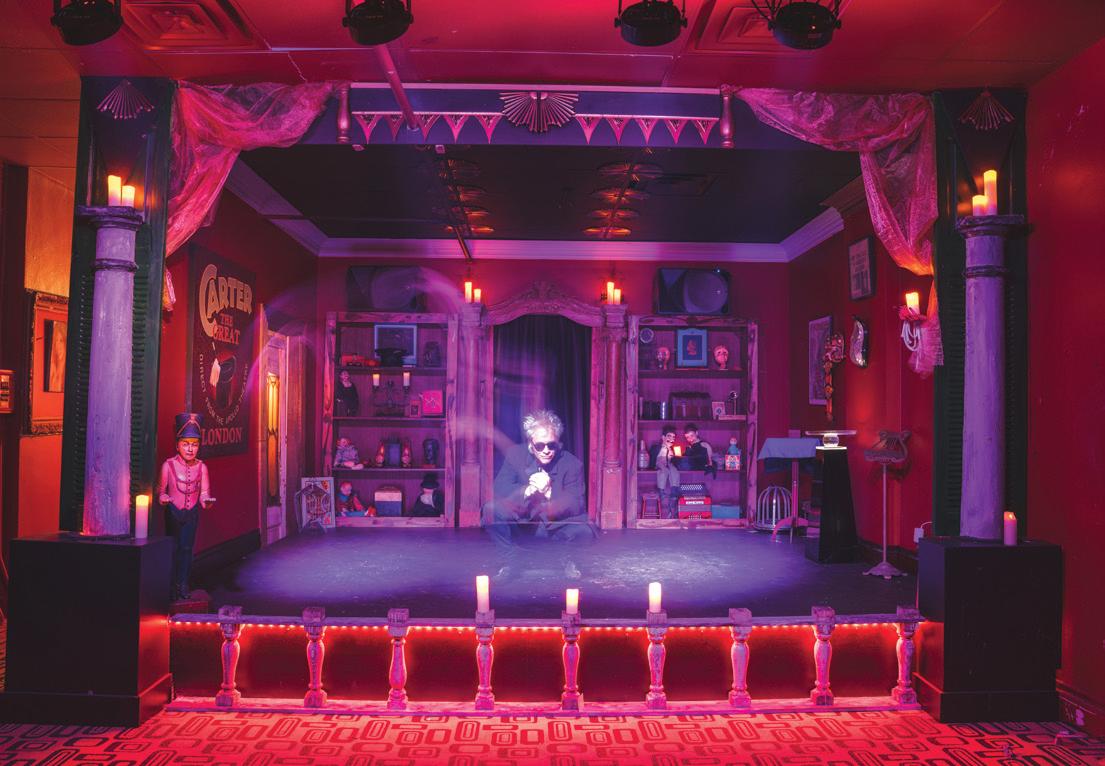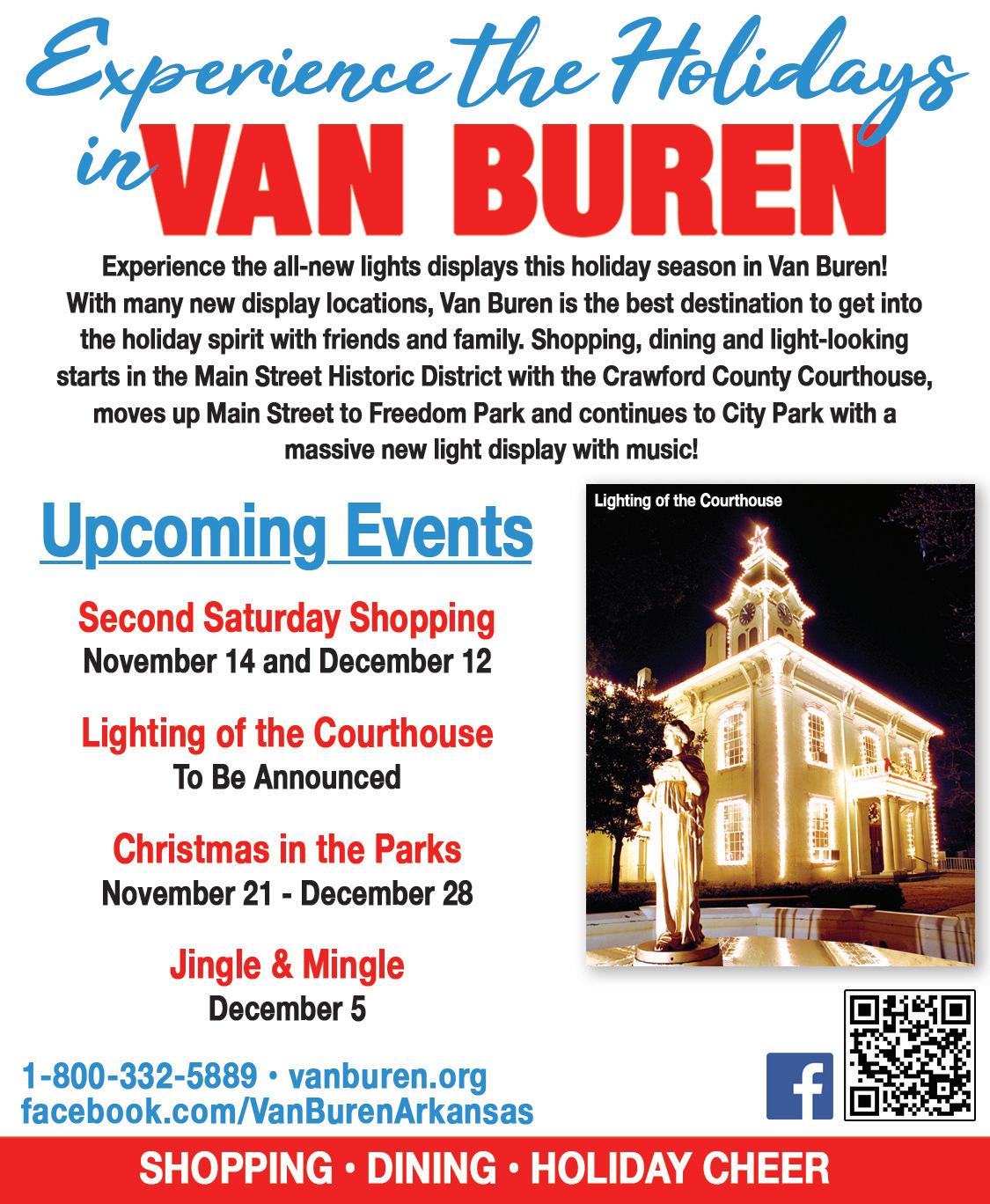
8 minute read
Recommendations Magic Man: Maxwell Blade
Magic Man
Maxwell Blade


Words Dwain Hebda images courtesy Brian G. Wilson Photography
IT’S SATURDAY NIGHT in Hot Springs and Arkansas’s entertainment hub is buzzing, if not quite at capacity, at least enough to make you feel the new excitement that has come into downtown in recent years. Aromas from nearby restaurants fill the air, a stream of cars and motorcycles glides by and bright lights pour out of bathhouse and bar.
Smack in the middle of it is the historic Malco Theatre, home to Maxwell Blade’s Theatre of Magic. The old girl looks good these days, thanks to nearly $1 million spent in renovations a few years back. Inside, the payoff from that investment is immediately apparent; the Malco is stunning and contains surprises around every corner, from the pocket bar to the original staircase mural to the main auditorium chock-full of theatrical and multi-media technology.
A full house is defined differently in the era of social distanced seating charts, but that’s what’s on hand for the family-friendly show. Nearby, a local family chats about the number of times they’ve been back to see performances while a couple of rows over, newlyweds gaze lovingly over popcorn. Sprinkled throughout are youngsters of all ages, each here ready to be amazed. Suddenly, the lights go down, the overture rises and for the seven thousand-one hundred-and-seventh time, Maxwell Blade takes the stage. Over the course of the next two hours he’s working, but it’s clear he’s at home.
“I will never stop performing. It’s just what I do.”
Maxwell Blade reclines in a front-row seat during an off-day. His trademark mane about his shoulders still yells rockand-roll, but outside the spotlight he is soft-spoken and self-deferential, his voice barely cutting through the darkness of the main theater, which feels a lot bigger empty.
When you tell him he doesn’t fit either the wacky magical madman or the brooding tortured-soul wizard you’d imagined, he laughs.
“After all these years, my character and myself have gelled and morphed into this person. It’s not really a character, it’s just me,” he says. “I do feel like, once the adrenaline pumps and you come out onstage, you do become a different
person. A character, in some aspects. But I keep in touch with me all the time.
“I’m not trying to be this mysterious guy who wouldn’t go out and meet you before the show. I meet people all of the time and I love that. But onstage, I’m a bit more charismatic and outspoken. And I have fun; I’m having as much fun as you are, if not more some nights, because I feed off the audience.
“I think with all performers, you can be too egotistical, too cocky and arrogant, where you don’t greet people or are not kind to people. I just never saw the sense in that. These people pay to see you. I get real with them, and they love that.”
Maxwell caught the magic bug growing up in Fort Smith when he saw a magician on television. He promptly borrowed some books on magic from the local library and was so immediately obsessed, he refused to return the books so as not to let others learn how to do the tricks. He’s unabashed about this youthful larceny, even pointing out those very books which he keeps onstage as a set piece.
The volumes are just one small artifact in a collection of entertainment and historical oddities he’s collected over decades in show business. Many are on display throughout the building and some await enshrinement in a forthcoming on-premises curiosities museum. Not unlike the magic show itself, he delights in blending the shiny and new with the tried-and-true.
“I’m not a magician’s magician where I try to fool all of the magicians. I’m an entertainer,” he says. “You have to be an entertainer to hold people’s attention for two hours.”
Music and magic are as inseparable to Maxwell’s act as it is to his heritage. Before he became an illusionist, he was a keyboard player in the 1980s band Exit 5 that became Shark Avenue. The band cut some albums and toured before going their separate ways. Maxwell’s way was magic, but not only did he not leave music behind, it’s very much part of what he does today.
“I’ll get the routines in my head. And then, I begin the process of picking or writing the music,” he says. “I’m looking through tracks or soundtracks or movie tracks, and the minute I hear it, that’s it. That is it. I don’t use elevator music. I use the good stuff.”
The show is a well-oiled delight. Furniture levitates, hollow tubes placed on an empty table produce bottle after bottle of wine, assistants disappear and reappear with mind-bending efficiency. For all but two tricks, Maxwell is the hub of the magic wheel, chatting up the audience, playing songs by his idol Elton John (with whom he got to share the stage) and looking for all the world like a man who loves what he’s doing.

“We’ve tried to make it a fun show, a family-oriented show,” he says. “It’s not a kiddie show; I tell people, ‘You’re going to have as much fun as the kids, if not more so.’
“This is my favorite show that I’ve produced, but we decided at this point that we’re going to pull about two-thirds of it out and start over. Some of these props I’ve been performing with for so many years, I need to challenge myself a bit.”
One would think after bringing the Malco back to life that Maxwell would’ve had enough challenges to last a lifetime. Built in 1910 as the Princess Theatre and rebuilt after a devastating fire in 1934, the former movie house hosted various entertainment through the years including traveling vaudeville acts that likely featured magicians.
Maxwell’s show played here in the 1990s before moving to a smaller venue up the street in 2012. Four years later, the building changed hands and the new owner invited him to come home. To this day, he can’t believe how things have come full circle.
“I passed by this building every day and I wished, I prayed, I hoped and put the good word out that I’d like to have this theater back,” he says. “It was a very difficult time in my life, I must tell you. Years later, I get a call from Rick Williams, who bought the building. He said, ‘You need to be here. This is your legacy. Let’s see what we can do.’”
What followed was fourteen months of work and about eight hundred thousand dollars in repairs and upgrades. The work was exhausting, made more so by the slabs of structural concrete throughout the building, thick enough that the theater was a designated bomb shelter in the 1950s and 1960s.
A tour of the place—from the bowels of the basement to a hidden door off the balcony leading to a former love-andbooze nest Maxwell converted into an apartment—reveals living, breathing Hot Springs history. Sobering, in one respect: the surviving “Colored” entrance from the building’s days as a segregated theater, in service from 1929 to 1964. It, like other parts of the huge structure, is a renovation work in progress; Maxwell has plans for preserving the chilling entryway as a testament to the struggle for equality.
Arguably the most fascinating part of the house is the fiftyseat close-up magic room, which Maxwell calls his “COVID project.” Delightfully eerie with a small stage that allows for close inspection of the performance, it gives Maxwell a different kind of venue to share the history and lore of the magician’s art.
“We all go back to the roots of magic,” he says. “Some of these props, the way they were done, the secrets, have been around for one hundred years. It’s important that we let the audience know, hey, this is a classic piece of magic. I do a bit in my show where I do classic pieces of magic given to me by my mentors and we talk about that.”
Even with this long artistic heritage, much has changed for the showman from Sebastian County over the decades, a painful divorce and a salvific bout with rehab among them. He talks freely about such scars in his act, further connecting with audiences. He thinks simultaneously about slowing down and expanding the theater’s roster of entertainment once COVID-19 tapers. The future is bright.
“For me, the theater, even now that it’s new and fresh, still has that old feel. You tie them together,” he says. “I think it’s important that you do that. Say you’re in Vegas in a brand-new, shiny theater and the props are all glitzy and glam and that’s that. This is a little bit different and you know and feel it as soon as you walk in. People aren’t sure what to expect and that’s part of the surprise.
“I’ll tell you, probably ninety percent of the folks that come in are just going to sit back, relax and enjoy the magic and not worry about how it’s done. Some of them will go, ‘It’s driving me crazy, man. I’ll pay you. How much you want?’ You can’t give me enough money to tell you how it’s done. Once I do that, it’s going to steal the magic from you.”
Maxwell Blade Theatre of Magic
817 Central Avenue, Hot Springs, AR 501.623.6200 | maxwellblade.com










